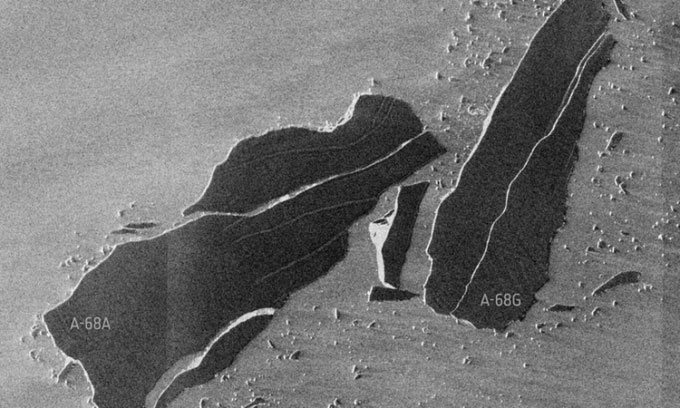Giant iceberg dumps 152 billion tons of fresh water into the sea
Iceberg A-68A releases large amounts of fresh water and nutrients into the sea, which can affect surrounding ecosystems.
In a statement on January 20, the European Space Agency (ESA) said that iceberg A-68A has released a huge volume of fresh water near the island of South Georgia, potentially affecting life. Sea creatures on the island. This amount of water is specifically 152 billion tons. According to the University of Leeds (UK), this is equivalent to 20 times the water volume of Loch Ness or 61 million Olympic-sized swimming pools.

Iceberg A-68A and broken chunks of ice, next to another large piece of A-68, called A-68G, in this 2021 satellite image.
The researchers used satellite imagery and data to measure meltwater from A-68A and published the results in the journal Remote Sensing of Environment.
A-68A is the largest piece of iceberg A-68 that broke off from the Larsen C ice shelf in Antarctica in 2017. A-68 is one of the largest icebergs ever recorded. It separates from the ice shelf by a normal natural process.
Three years later, it drifted into warmer waters and threatened South Georgia Island, an important habitat for penguins, seals and other wildlife. Fortunately, this giant iceberg later broke off.
Along with freshwater, A-68A also releases many nutrients into the ocean. "This is a huge amount of water from melting ice. The next thing we wanted to find out was whether it had a positive or negative impact on the ecosystem around South Georgia," said Anne Braakmann-Folgmann, an expert at the University of California. Leeds, said.
In late 2020, ecologist Geraint Tarling at the British Antarctic Survey (BAS) said that dust contained in icebergs could provide nutrients for plankton in the sea, thereby boosting the food chain. local.
According to the BAS, South Georgia is an important habitat for seals, endangered birds, fish and migratory whales. Although the risk of A68-A stranding is no longer present, new questions arise regarding the impact of water and nutrients from the ice sheet on the ecosystem in this area. Scientists will need more time to find out the answer.
- Video: Consequences of 1,000 billion tons of icebergs separated from Antarctica
- The ice is four times bigger than London is heading to the sea
- 4 scenario is happening when the largest iceberg in history has just broken in Antarctica
- The one trillion tons of ice has separated from Antarctica
- Revealing the iceberg sank the legendary Titanic
- Ice floats 11 million tons
- Antarctic ice disappeared 2700 billion tons during the last 25 years
- 50% of the world's population lacks fresh water by 2050
- Discover the giant 'iceberg city' in Antarctica
- Create fresh water with solar energy
- 8th graders make devices that turn seawater into fresh water
- Add a giant iceberg from Antarctica
 Is the magnetic North Pole shift dangerous to humanity?
Is the magnetic North Pole shift dangerous to humanity? Washington legalizes the recycling of human bodies into fertilizer
Washington legalizes the recycling of human bodies into fertilizer Lightning stone - the mysterious guest
Lightning stone - the mysterious guest Stunned by the mysterious sunset, strange appearance
Stunned by the mysterious sunset, strange appearance